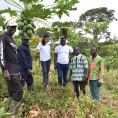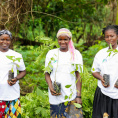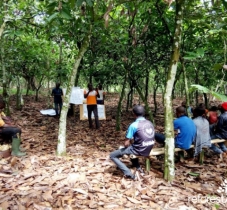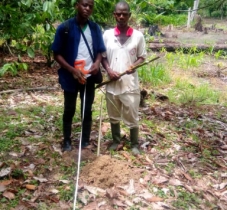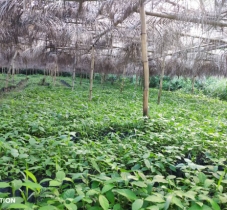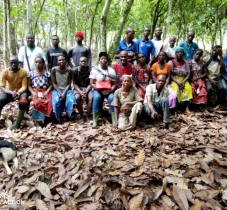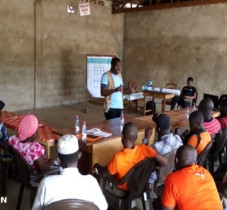Project description
In the Ivoiry Coast, our reforestation project aims to train cocoa producers in agroforestry, enabling them to plant shade trees in their fields to ensure the sustainability of their plantations.
The project at a glance
- Number of trees to be planted: 320 000 over two planting seasons
- Species planted: Terminalia superba (Faké); Terminalia ivorensis (Framiré); Ricinodendron heudelotii (Akpi); Garcinia kola (Little kola); Acacia mangium (Acacia); Gliricidia sepium (Gliciridia)
- Planting period: May to September
The context of the project
Deforestation in the Ivoiry Coast, unless it's stopped, could lead to the total disappearance of the country's natural forest cover in the next 20 years. The territory's 234 classified forests, including the Séguié forest in the Agnéby-Tiassa region where our project is taking place, have lost more than 70% of their forest cover in the space of half a century. This is due to extensive agriculture and cocoa production, which have been gaining ground on the primary forests of Ivoiry Coast, and the unsustainable exploitation of these forests to meet the growing need for firewood. This loss of animal and plant biodiversity is now causing climate change in the region, including reduced rainfall and increasingly long periods of drought, often fatal to the crops of local communities. In this context, Reforest'Action is partnering with the Ivorian company Agro-Map to support cocoa producers in the forest of Séguié in the restoration of the forest and in the creation of agroforestry systems, which will make it possible to reconcile trees and crops. By restoring their environment, the local communities of Agnéby-Tiassa will also improve their food security and income.
Our partner and our actions in the field
A partnership between Reforest'Action and the company Agro-Map
Agro-Map is an Ivorian company specialized in the development of sustainability projects in the agricultural, forestry and environmental fields. Its objective: to reconcile agriculture and forestry in order to maintain a microclimate favourable to the development of agriculture. The Agro-Map team is in permanent contact with farmers and builds strong partnerships with local communities.
Local communities, at the heart of the project
The tree plantations, carried out with funding from Reforest'Action and technical support from Agro-Map, are taking place on portions of land scattered throughout the Agnéby-Tiassa region. These plots are agricultural wastelands with potential for regeneration or conversion to forest, ranging from 1 to 3 hectares in size. They are owned by local producers and are fully integrated into their farming systems. These communities are involved in the many actions set up:
- Restoration of forest patches located near the classified forest of Séguié. The local communities are involved in the production of forest seedlings in nurseries and in the preparation of the planting sites. The reforestation of more than 100 hectares will enable the populations to reconstitute the forest around their villages.
- Creation of agro-forestry systems. The Agro-Map team is training local communities to set up sustainable agro-forestry systems by planting trees in their coffee and cocoa fields. These trees will protect their crops from too much sunlight and enrich the soil by fixing nitrogen.
- Raising community awareness. In parallel with the plantations, Agro-Map is deploying a programme to educate local communities about forest protection and the sustainability of the agro-forestry systems that have been set up.
Species planted on the project
A great diversity of species is planted on the project within the different zones:
- Fraké and framiré: these forest species, planted in the forest islands to be restored or in agroforestry, will make it possible to obtain firewood and timber while preserving the wild forest of Séguié.
- Akpi and small cola: these fruit species, also planted in agroforestry, will both protect the underlying crops and generate additional income for the population through the sale of the fruit.
- Acacia and gliricidia: these leguminous species, planted as quickset hedges in the fields, will provide fodder for livestock and shade for the underlying crops.
The benefits of the project
- Restoration of the classified forest of Séguié. The restored forest will again be able to regulate the climatic cycles and bring rain back to the region. The local communities will be able to obtain supplies of medicinal plants within the forest.
- Creation of habitats for biodiversity. The restored forest will, over time, host increased wildlife, which is now endangered.
- Creation of a synergy between trees and crops. Planted in agroforestry in the cocoa and coffee fields, the trees will enrich the soil and protect the crops; the harvests will improve over the years. Local communities will also be able to feed on the fruits from the planted fruit trees.
- Timber and fuelwood generation. Managed sustainably by local communities, the trees planted in agroforestry will produce wood for personal use or for generating additional income through its sale.
- Raising awareness among local populations about sustainable development and forest protection.
News from the field
Côte d’Ivoire: the reforestation and creation of agroecosystems continuesSince the beginning of the project, 204,426 trees have been planted to restore forest plots and set
Côte d'Ivoire is one of the most deforested countries in the world, a situation caused by agriculture ( notably cocoa cultivation), logging (to su
Ivory Coast: restoring degraded forests and supporting cocoa producersSince January 2020, Reforest'Action has been working in southern Ivory Coast alongside local co
Since January 2020, Reforest'Action has been working in southern Ivory Coast alongside local company Agro-Map, which specializes in the development of sustainability proj


